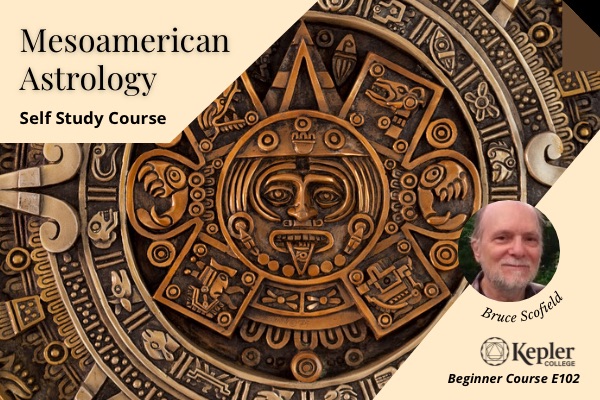
In this course students will become acquainted with the nature of Mesoamerican astrology and its foundations in the cosmology and mythology of the several cultures that flourished in ancient Mexico and northern Central America.
- Teacher: Bruce Scofield
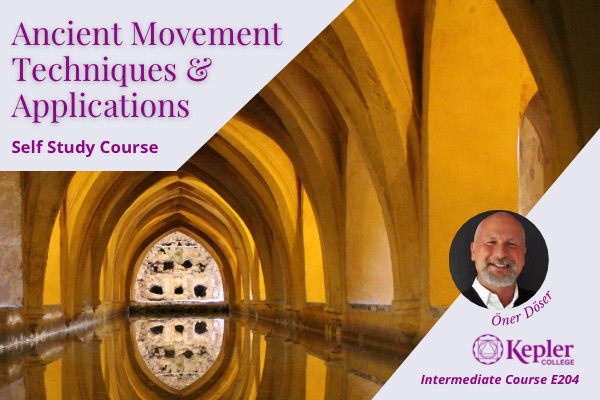
Required Books: Astrological Prediction: A Handbook of Techniques
Dec 15 2014- by Oner Doser and Benjamin N Dykes
It is also recommended that you gather a handful of charts that you wish to work on and apply the techniques in each week (these might be personal or famous with access to a large biography or willing to answer questions).
Other Recommended books:
-Professional Significators in Traditional Astrology
Nov 16 2018 - by Oner Doser and Benjamin N Dykes
-Financial Significators in Traditional Astrology
Nov 12 2018 -by Oner Doser and Benjamin N Dykes
-Astrology of the Famed: Startling Insights into Their Lives (Llewellyn's New World Astrology Series) by Noel Tyl (1996-05-08)
Pre-requisite: None
Course description:
Predicting the future is an intuitive need in human nature. The ability of astrologers to make predictions is one of the main reasons why astrology has stood the test of time. The skilled make more accurate predictions, and it is this skill that can lead to higher wisdom.
Predictive techniques like Secondary progressions, Solar Return Charts, Solar Arc progressions, and especially Transits are widely used by modern astrologers. Some of the predictive techniques of classical astrology are often the source of our modern practice and can be successfully blended with modern methodologies.
Traditional predictive techniques help us to understand the patterns of fate. First, an individual's life is divided into main periods and then these periods are divided into small sub-periods. Thus we are able to both see the details and the general course of our life. The predictive techniques in Traditional Astrology are systemized and orderly. They give us certain rules for analyzing the chart and making predictions. They propose a deductive approach while predicting the general course of life.
In this course you will learn and practice using:
- To use the Ages of Man technique for determining longer periods within a lifetime
- Prediction by Fidaria, a planetary period system from Abu Mashar which is similar to the dasha system in Vedic astrology
- Direction by terms and bounds which describes the types of events and developments that take place during specific time periods
- Direction by triplicity in 25-year segments applied to each of the houses
- Integration of the above traditional predictive techniques
Weekly topics:
1. Ages of Man
2. Firdaria
3. Directing by Terms and Bounds
4. Direction by Triplicity
- Teacher: Oner Doser
- Teacher: Çagla Ercanoglu

Most chart interpretation is done on the ecliptic using standard aspects and sign and house positions. But there are other ways to get similar information from a chart that are based entirely on symmetry. Probably best known of the symmetrical techniques is declination, planet distance relative to the celestial equator. Other traditional techniques that employ symmetry include antisia and Arabic points. The Hamburg School, aka Uranian Astrology, and later Ebertin's Cosmobiology, place a major emphais on symmetry and nearly all interpretive work is based on it.
- Teacher: Bruce Scofield
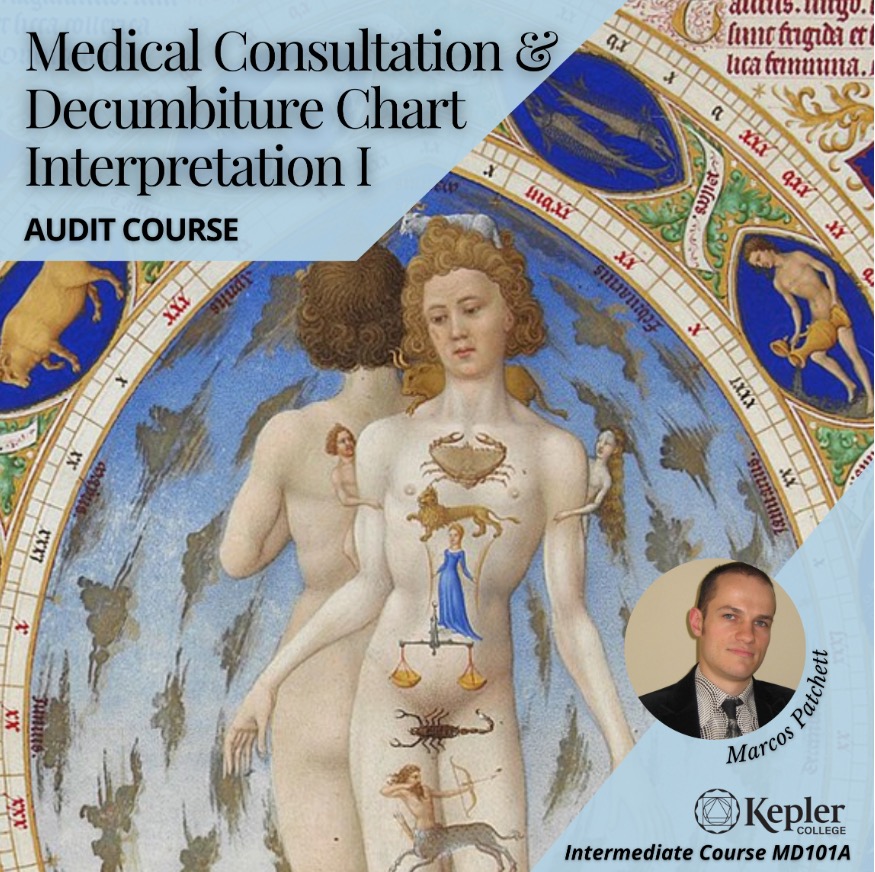
This Medical Astrology course is intended for general informational and historic purposes only, and does not constitute medical diagnosis, opinion, fact, directives or advice. Individuals should always seek their physician’s approval before considering any ideas, hypotheses or ancient knowledge imparted by the teachers of MD100. Any application of the information set forth in this course is at the student's discretion and is his or her sole responsibility.
Kepler College and the course teachers of MD100 are not responsible for student misuse or medical use (for self or others, including clients, family, and friends) of course material and information.
- Teacher: William Morris
- Teacher: Marcos Patchett
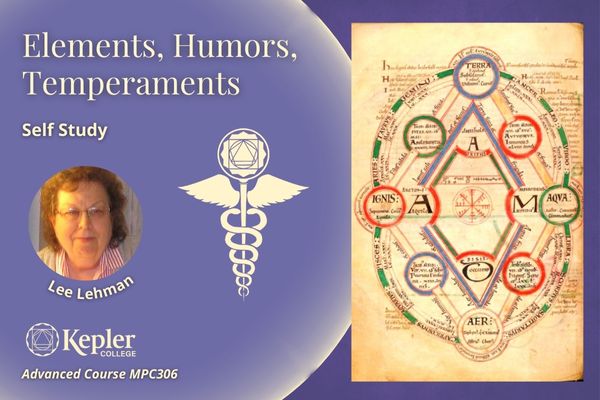
The purpose of this course is to first, consider the extent to which temperaments were astrologically computed at all, and then to compare three systems of computing the temperament. Students will also examine how the determination of temperament can be used to assess both lifestyle considerations, and remedy suggestions
Weekly Topics:
- Temperaments and tonics
- Comparative calculational methods
- Humors applied
- Humoral pathology
- Student practice and presentations
Pre-requisite:
Basic astrological knowledge, as reflected in achievement of Kepler College Fundamentals Certificate or equivalent.
- Teacher: Lee Lehman
- Teacher: Lee Lehman
- Teacher: William Morris
- Teacher: Mercedes Stewart
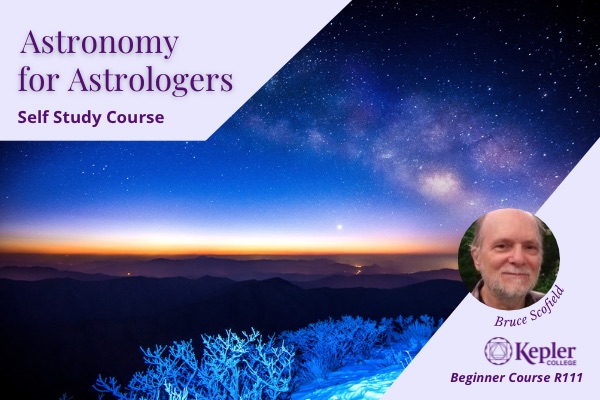
Astronomy is the
study of the nature, motions and history of the Earth's cosmic environment.
Astronomy is a highly developed science and encompasses many technical
subjects. In this course, Kepler E400, the emphasis is on subject matter
relevant to a general and non-technical understanding of astronomy. The course
is a unique introduction to astronomy presented at the 12th grade or first year
college level, and would benefit students of astrology or anyone seeking a
practical overview of the subject.
This is a self-motivated course that requires the student to set aside time
each week to study the material presented. Learning in this course depends on
taking the time to go over the assigned readings, listening to the lectures,
and doing the weekly assignments. The readings overlap with the lectures and
provide additional information. The assignments are based primarily on the
lectures which set the parameters of each week's topic. In addition to the
lectures and assigned readings, assignments for the course include online
forums, multiple choice questions, and a short report on a relevant topic.
- Teacher: Bruce Scofield
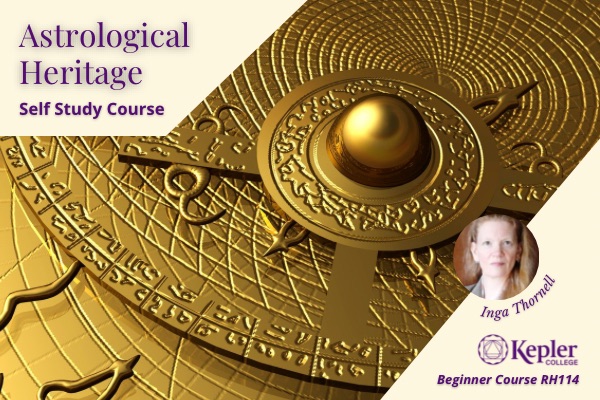
Required Books:
- A History of Western Astrology Volume I: The Ancient and Classical Worlds Original title: The Dawn of Western Astrology: The Ancient and Classical Worlds by Nicholas Campion
- A History of Western Astrology Volume II: The Medieval and Modern Worlds by Nicholas Campion
Suggested Texts:
If you are interested in learning more about the topics:
- A History of Horoscopic Astrology
by
James Herschel Holden
Paperback: 376 pages
Publisher: American Federation of Astrologers, Inc.; 2nd edition (October 1,
1996) Language: English ISBN-10: 0866904638 ISBN-13: 978-0866904636
- Mythology Cliff Notes
Cliffs Notes study guides offer expert commentary on major themes, plots, characters, literary devices, and historical background.
Pre-requisite: No prerequisite.
Course description:
Students will:
- Examine how astrology originated in various cultures and what questions it sought to address
- See how astrology became embedded in mainstream culture in these societies
- Study the lineages in which different astrological theories developed
- Examine the relationship between the history of science and religion, philosophy and mythology
- Examine the changes in cosmology throughout history and how these changes affected society's attitudes.
- Critique the intellectual shifts in religion and philosophy that led to the modern scientific and secular worldview, and the rejection of intuitive ways of knowing
- Explore how changes in 20th-century philosophy and science affected the arts and sciences, and how 21st-century research is moving toward a more inclusive world view.
This course is required for the Certificate Diploma, although it can also be taken as an elective.
Weekly topics:
1. Mesopotamian Contributions
2. Egyptian Contributions
3. Greek Contributions
4. Hellenistic Astrology
5. Rome and Astral Religions
6. Early Christianity and Astrology
7. The Islamic World
8. The Latin West
9. The Renaissance
10. Other Astrologies
- Teacher: Inga Thornell (she/her)

Required Books:
- A History of Western Astrology Volume I: The Ancient and Classical Worlds Original title: The Dawn of Western Astrology: The Ancient and Classical Worlds by Nicholas Campion
- A History of Western Astrology Volume II: The Medieval and Modern Worlds by Nicholas Campion
Suggested Texts:
If you are interested in learning more about the topics:
- A History of Horoscopic Astrology
by
James Herschel Holden
Paperback: 376 pages
Publisher: American Federation of Astrologers, Inc.; 2nd edition (October 1,
1996) Language: English ISBN-10: 0866904638 ISBN-13: 978-0866904636
- Mythology Cliff Notes
Cliffs Notes study guides offer expert commentary on major themes, plots, characters, literary devices, and historical background.
Pre-requisite: No prerequisite.
Course description:
Students will:
- Examine how astrology originated in various cultures and what questions it sought to address
- See how astrology became embedded in mainstream culture in these societies
- Study the lineages in which different astrological theories developed
- Examine the relationship between the history of science and religion, philosophy and mythology
- Examine the changes in cosmology throughout history and how these changes affected society's attitudes.
- Critique the intellectual shifts in religion and philosophy that led to the modern scientific and secular worldview, and the rejection of intuitive ways of knowing
- Explore how changes in 20th-century philosophy and science affected the arts and sciences, and how 21st-century research is moving toward a more inclusive world view.
This course is required for the Certificate Diploma, although it can also be taken as an elective.
Weekly topics:
1. Mesopotamian Contributions
2. Egyptian Contributions
3. Greek Contributions
4. Hellenistic Astrology
5. Rome and Astral Religions
6. Early Christianity and Astrology
7. The Islamic World
8. The Latin West
9. The Renaissance
10. Other Astrologies
- Teacher: Inga Thornell (she/her)
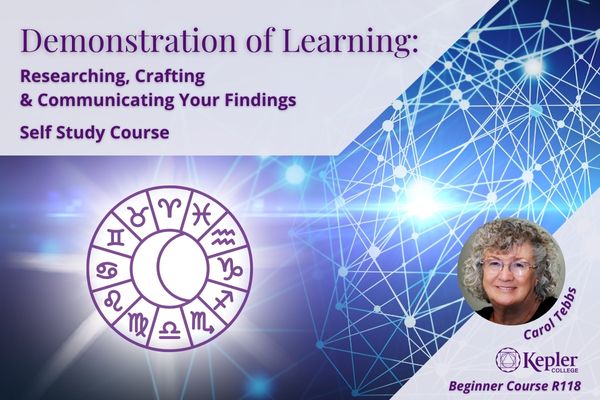
To earn the four year KPDA diploma, Kepler College requires students to complete a final “Demonstration of Learning” project that includes research on an interesting or controversial astrological topic that can be proven with research.
Once the project is completed and approved by the advisor, the student has several choices to share the project results with the astrology community and build a good reputation for astrology in academic fields.
Research is digging into a narrowed topic to find information from other authors and researchers who support or refute a point of view that becomes a thesis statement. At that point new evidence is built to support the thesis with evidence through several tests of its validity. The conclusion is based on the verified research findings that will be shared with the astrology community.
Students doing this final required project for the Kepler Professional Diploma of Astrology will confirm they are:
- A well-trained and competent astrologer
- Prepared for acceptance in the astrology community
- Confident that they are ready for clients
Weekly Topics:
- Choose an Astrological Topic to Research
- Find References on the Topic to Compare
- Create a Working Outline
- Finding the Research Sources and Formats
- Address Both Supporting and Challenging Evidence
- Make a Final Thesis Statement, or What is To Be Proved
- Prepare a Conclusion for the Closing Summary
- Submit the Final Research Project for Evaluation
- Choose a Format to Present the Findings
- Build the Format for Presentation – Writing, Speaking, Video, etc.
Prerequisite:
Students must be in their last 18 months of study to complete the Diploma or Advanced Diploma.
Students will have one year access to the material and the mentor.
Required Reading:
To be provided.
- Teacher: Carol Tebbs
- Non-editing teacher: Enid Newberg
- Non-editing teacher: Jenn Zahrt
